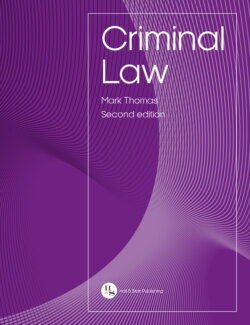Читать книгу Criminal Law - Mark Thomas - Страница 99
На сайте Литреса книга снята с продажи.
2.6.6Act or omission?
ОглавлениеUp to this point, we have discussed the difference between positive acts or conduct and a failure to act. One thing to note, however, is that such a distinction is not an easy one to draw. Child and Ormerod (Smith, Hogan, & Ormerod’s Essentials of Criminal Law, 3rd edn (OUP, 2019)) provide an excellent example of the difficulty in making this distinction, which has been adapted to conform to our previous examples.
example
Jack and Jill are playing tug-of-war and Jack lets go of the rope, causing Jill to fall and hurt herself. In this instance, the question becomes whether Jack has:
• acted (ie by letting go of the rope); or
• omitted (ie by stopping pulling the rope).
One might say that we look towards Jack’s intention to find whether his letting go of the rope was an act or omission; however, this results in the blurring of the elements of actus reus and mens rea. In this scenario, it is likely that Jack will have acted in letting go of the rope given that the pair were engaging in a tug-of-war and it appears nonsensical that Jack should suddenly fail to continue to pull the rope. That is but one interpretation and demonstrates that the line between a positive act and an omission is not an easy one to draw. This is especially so given that we may not be fully aware of the facts of the case. Suppose Jack let go of the rope because a bee was flying around his head, or he noticed that someone was in peril and required assistance. Those circumstances would suggest a failure to continue pulling the rope as opposed to an act of letting go of the rope.
What this example should show is that it is not always clear whether we are dealing with an act or an omission. This statement does not just apply to students studying the law, but to members of the judiciary applying/interpreting the law. Take the case of R v Speck [1977] 2 All ER 859 as an example.
case example
Charge: Gross indecency (Indecency with Children Act 1960, s 1)
Case progression: Crown Court – Guilty
Court of Appeal – Conviction upheld
Point of law: The definition of an act or omission varies
In R v Speck [1977] 2 All ER 859, the victim, a young girl, placed her hand on the defendant’s penis causing him to have an erection. The defendant failed to move the girl’s hand. The defendant was charged with and convicted of gross indecency in the Crown Court (an offence now contained in the Sexual Offences Act 2003).
The defendant appealed to the Court of Appeal, arguing that the offence required an ‘act of gross indecency’. The Court ruled that although the defendant’s failure to remove the girl’s hand amounted to an omission, the inactivity on the part of the defendant was an ‘invitation to the child to undertake the act’.
Speck demonstrates that although the statute required an ‘act’ on part of the defendant, his inactivity in preventing the girl from continuing her act could amount to an act of gross indecency. The inactivity itself amounted to an invitation for the girl to continue in her actions and thus was sufficient for the jury to find the defendant liable. On Speck, Herring (Criminal Law: Text, Cases, and Materials, 9th edn (OUP, 2020)) contends that the conduct of the defendant could ‘more naturally be regarded as an omission’. Herring goes on to say that ‘[i]t is hard to avoid the feeling that the court understandably disapproved of the man’s actions and so labelled it as an act to ensure a conviction’.
